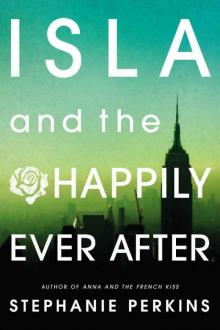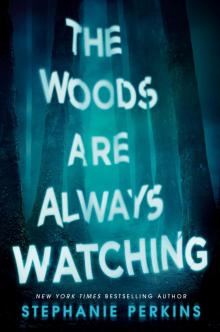- Home
- Stephanie Perkins
Anna and the French Kiss Page 6
Anna and the French Kiss Read online
Page 6
He sits down on the edge of my bed. “Your parents are divorced?”
I hover by my desk chair, because I can’t sit next to him on the bed. Maybe when I’m used to his presence, I might be able to manage that particular feat. But not yet. “Yeah. My dad left six months after Sean was born.”
“I’m sorry.” And I can tell he means it. “Mine are separated.”
I shiver and tuck my hands underneath my arms. “Then I’m sorry, too. That sucks.”
“It’s all right. My father’s a bastard.”
“So is mine. I mean, obviously he is, if he left us when Seany was a baby. Which he totally did. But it’s also his fault I’m stuck here. In Paris.”
“I know.”
He does?
“Mer told me. But I guarantee you that my father is worse. Unfortunately, he’s the one here in Paris, while my mum is alone, thousands of miles away.”
“Your dad lives here?” I’m surprised. I know his dad is French, but I can’t imagine someone sending their child to boarding school when they live in the same city. It doesn’t make sense.
“He owns an art gallery here and another in London. He divides his time between them.”
“How often do you see him?”
“Never, if I can help it.” St. Clair turns sullen, and it dawns on me that I have no idea why he’s even here. I say as much.
“I didn’t say?” He straightens up. “Oh.Well. I knew if someone didn’t come and physically drag you outside, you’d never leave. So we’re going out.”
A strange mix of butterflies and churning erupts in my stomach. “Tonight?”
“Tonight.”
“Right.” I pause. “And Ellie?”
He falls back, and now he’s lying down on my bed. “Our plans fell through.” He says this with a vague wave of his hand, in a way that keeps me from inquiring further.
I gesture at my pajama bottoms. “I’m not exactly dressed for it.”
“Come on, Anna. Do we honestly have to go through this again?”
I give him a doubtful look, and the unicorn pillow flies at my head. I slam it back, and he grins, slides off the bed, and smacks me full force. I grab for it but miss, and he hits me again twice before letting me catch it. St. Clair doubles over in laughter, and I whack him on the back. He tries to reclaim it, but I hold on and we wrestle back and forth until he lets go. The force throws me onto the bed, dizzy and sweaty.
St. Clair flops down beside me, breathing heavily. He’s lying so close that his hair tickles the side of my face. Our arms are almost touching. Almost. I try to exhale, but I no longer know how to breathe. And then I remember I’m not wearing a bra.
And now I’m paranoid.
“Okay.” He’s panting. “Here’s the”—pant pant—“plan.”
I don’t want to feel this way around him. I want things to be normal. I want to be his friend, not another stupid girl holding out for something that will never happen. I force myself up. My hair has gone all crazy and staticky from the pillow fight, so I grab an elastic band off my dresser to pull it back.
“Put on some proper trousers,” he says. “And I’ll show you Paris.”
“That’s it? That’s the plan?”
“The whole shebang.”
“Wow. ‘Shebang.’ Fancy.”
St. Clair grunts and chucks the pillow at me. My phone rings. It’s probably my mom; she’s called every night this week. I swipe my cell off my desk, and I’m about to silence the ringer when the name flashes up. My heart stops.
Toph.
chapter eight
I hope you’re wearing a beret.” This is how Toph greets me.
I’m already laughing. He called! Toph called!
“Not yet.” I pace the short length of my room. “But I could pick one up for you, if you’d like. Get your name stitched onto it.You could wear it instead of your name tag.”
“I could rock a beret.” There’s a grin in his voice.
“No one can rock a beret. Not even you.”
St. Clair is still lying on my bed. He props up his head to watch me. I smile and point to the picture on my laptop. Toph, I mouth.
St. Clair shakes his head.
Sideburns.
Ah, he mouths back.
“So your sister came in yesterday.” Toph always refers to Bridge as my sister. We’re the same height with the same slender build, and we both have long, stick-straight hair, although hers is blond and mine is brown. And, as people who spend tons of time together are prone to do, we talk the same.Though she uses bigger words. And her arms are sculpted from the drumming. And I have the gap between my teeth, while she had braces. In other words, she’s like me, but prettier and smarter and more talented.
“I didn’t know she was a drummer,” he says. “She any good?”
“The best.”
“Are you saying that because she’s your friend, or because she’s actually decent?”
“She’s the best,” I repeat. From the corner of my eye, I see St. Clair glance at the clock on my dresser.
“My drummer abandoned ship. Think she’d be interested?”
Last summer Toph started a punk band, the Penny Dreadfuls. Many member changes and arguments over lyrical content have transpired, but no actual shows. Which is too bad. I bet Toph looks good behind a guitar.
“Actually,” I say, “I think she would. Her jerkwad percussion instructor just passed her up as section leader, and she has some rage to funnel.” I give him her number. Toph repeats it back as St. Clair taps an imaginary wristwatch. It’s only nine, so I’m not sure what his rush is. Even I know that’s early for Paris. He clears his throat loudly.
“Hey, I’m sorry. I need to go,” I say.
“Is someone there with you?”
“Uh, yeah. My friend. He’s taking me out tonight.”
A beat. “He?”
“He’s just a friend.” I turn my back to St. Clair. “He has a girlfriend.” I squeeze my eyes shut. Should I have said that?
“So you’re not gonna forget about us? I mean ...” He slows down. “Us here in Atlanta? Ditch us for some Frenchie and never return?”
My heart thrums. “Of course not. I’ll be back at Christmas.”
“Good. Okay,Annabel Lee. I should get back to work anyway. Hercules is probably pissed I’m not covering the door. Ciao.”
“Actually,” I say. “It’s au revoir.”
“Whatever.” He laughs, and we hang up.
St. Clair gets up from the bed. “Jealous boyfriend?”
“I told you. He’s not my boyfriend.”
“But you like him.”
I blush. “Well ... yeah.”
St. Clair’s expression is unreadable. Maybe annoyed. He nods toward my door. “You still want to go out?”
“What?” I’m confused. “Yeah, of course. Lemme change first.” I let him out, and five minutes later, we’re headed north. I’ve thrown on my favorite shirt, a cute thrift-store find that hugs me in the right places, and jeans and black canvas sneakers. I know sneakers aren’t very French—I should be wearing pointy boots or scary heels—but at least they aren’t white. It’s true what they say about white sneakers. Only American tourists wear them, big ugly things made for mowing grass or painting houses.
It’s a beautiful night.The lights of Paris are yellow and green and orange. The warm air swirls with the chatter of people in the streets and the clink of wineglasses in the restaurants. St. Clair has brightened back up and is detailing the more gruesome aspects of the Rasputin biography he finished this afternoon.
“So the other Russians give him this dose of cyanide in his dinner, lethal enough to kill five men, right? But it’s not doing anything, so Plan B—they shoot him in the back with a revolver. Which still doesn’t kill him. In fact, Rasputin has enough energy to strangle one of them, so they shoot him three more times. And he’s still struggling to get up! So they beat the bloody crap out of him, wrap him in a sheet, and throw him into an icy river. But
get this—”
His eyes shimmer. It’s the same look Mom gets when she’s talking about turtles, or Bridge gets when she’s talking about cymbals.
“During the autopsy, they discovered the actual cause of death was hypothermia. From the river! Not the poisoning or the shooting or the beating. Mother Nature. And not only that, but his arms were found frozen upright, like he’d tried to claw his way out from underneath the ice.”
“What? No—”
Some German tourists are posing in front of a storefront with peeling golden letters. We scoot around them, so as not to wreck their picture. “It gets better,” he says. “When they cremated his body, he sat up. No, he did! Probably because the bloke who prepared his body forgot to snip the tendons, so they shrank up when he burned—”
I nod my head in appreciation. “Ew, but cool. Go on.”
“—which made his legs and body bend, but still.” St. Clair smiles triumphantly. “Everyone went mad when they saw it.”
“And who says history is boring?” I smile back, and everything is perfect. Almost. Because this is the moment we pass the entrance to SOAP, and now I’m farther from the school than I’ve ever been before. My smile wavers as I revert to my natural state of being: nervous and weird.
“You know, thanks for that. The others always shut me up long before—” He notices the change in my demeanor and stops. “Are you all right?”
“I’m fine.”
“Yes, and has anyone ever told you that you are a terrible liar? Horrid. The worst.”
“It’s just—” I hesitate, embarrassed.
“Yeeesss?”
“Paris is so . . . foreign.” I struggle for the right word. “Intimidating.”
“Nah.” He quickly dismisses me.
“Easy for you to say.” We step around a dignified gentleman stooping over to pick up after his dog, a basset hound with a droopy stomach. Granddad warned me that the sidewalks of Paris were littered with doggie land mines, but it hasn’t been the case so far. “You’ve been acquainted with Paris your whole life,” I continue. “You speak fluent French, you dress European ...”
“Pardon?”
“You know. Nice clothes, nice shoes.”
He holds up his left foot, booted in something scuffed and clunky. “These?”
“Well, no. But you aren’t in sneakers. I totally stick out. And I don’t speak French and I’m scared of the métro and I should probably be wearing heels, but I hate heels—”
“I’m glad you’re not wearing heels,” St. Clair interrupts. “Then you’d be taller than me.”
“I am taller than you.”
“Barely.”
“Please. I’ve got three inches on you. And you’re wearing boots.”
He nudges me with his shoulder, and I crack a smile. “Relax,” he says. “You’re with me. I’m practically French.”
“You’re English.”
He grins. “I’m American.”
“An American with a English accent. Isn’t that, like, twice as much for the French to hate?”
St. Clair rolls his eyes. “You ought to stop listening to stereotypes and start forming your own opinions.”
“I’m not stereotyping.”
“Really? Please, then, enlighten me.” He points to the feet of a girl walking ahead of us. She’s yakking in French on a cell phone. “What exactly are those?”
“Sneakers,” I mumble.
“Interesting. And the gentlemen over there, on the other side of the pavement. Would you care to explain what the one on the left is wearing? Those peculiar contraptions strapped to his feet?”
They’re sneakers, of course. “But hey. See that guy over there?” I nod toward a man in jean shorts and a Budweiser T-shirt. “Am I that obvious?”
St. Clair squints at him. “Obviously what? Balding? Overweight? Tasteless?”
“American.”
He sighs melodramatically. “Honestly, Anna. You must get over this.”
“I just don’t want to offend anyone. I hear they offend easily.”
“You’re not offending anyone except me right now.”
“What about her?” I point to a middle-aged woman in khaki shorts and a knit top with stars and stripes on it. She has a camera strapped to her belt and is arguing with a man in a bucket hat. Her husband, I suppose.
“Completely offensive.”
“I mean, am I as obvious as her?”
“Considering she’s wearing the American flag, I’d venture a no on that one.” He bites his thumbnail. “Listen. I think I have a solution to your problem, but you’ll have to wait for it. Just promise you’ll stop asking me to compare you to fifty-year-old women, and I’ll take care of everything.”
“How? With what? A French passport?”
He snorts. “I didn’t say I’d make you French.” I open my mouth to protest, but he cuts me off. “Deal?”
“Deal,” I say uncomfortably. I don’t care for surprises. “But it better be good.”
“Oh, it’s good.” And St. Clair looks so smug that I’m about to call him on it, when I realize I can’t see our school anymore.
I don’t believe it. He’s completely distracted me.
It takes a moment for me to recognize the symptoms, but my heels are bouncing and my stomach is fluttering. I’m finally excited to be out! “So where are we going?” I can’t keep the eagerness from my voice. “The Seine? I know it’s up here somewhere. Are we going to sit on the riverbank?”
“Not telling. Keep walking.”
I let this pass.What’s wrong with me? That’s the second time in one minute I’ve let him keep me in suspense. “Oh! You have to see this first.” He grabs my arm and pulls me across the street. An angry scooter honks its puny horn, and I laugh.
“Wait, what—” And then I’m knocked breathless.
We’re standing in front of an absolute beast of a cathedral. Four thick columns hold up a Gothic facade of imposing statues and rose windows and intricate carvings. A skinny bell tower stretches all the way into the inky blackness of the night sky. “What is it?” I whisper. “Is it famous? Should I know it?”
“It’s my church.”
“You go here?” I’m surprised. He doesn’t seem like the church-going type.
“No.” He nods to a stone placard, indicating I read it.
“Saint Etienne du Mont. Hey! Saint Etienne.”
He smiles. “I’ve always been a bit proprietary about it. Mum used to bring me here when I was young. We’d take a picnic lunch and eat it right here on the steps. Sometimes she’d bring her sketchbook, and she’d draw the pigeons and the taxis.”
“Your mother is an artist?”
“A painter. Her work is in the New York MoMA.” He sounds proud, and I remember what Meredith once said—that St. Clair admires Josh because he can draw so well. And that St. Clair’s father owns two art galleries. And that St. Clair is taking studio art this semester. I wonder aloud if he’s also an artist.
He shrugs. “Not really. I wish I were. Mum didn’t pass on that particular talent, just the appreciation. Josh is much better. So is Rashmi, for that matter.”
“You get along well with her, don’t you? Your mom?”
“I love me mum.” He says this matter-of-factly, with no trace of teenage shame.
We stand before the cathedral’s double doors and look up, and up, and up. I picture my own mom, typing snapping turtle data into our home computer, her usual evening activity. Except it’s not nighttime in Atlanta. Maybe she’s grocery shopping. Wading in the Chattahoochee River. Watching The Empire Strikes Back with Sean. I have no idea, and it bothers me.
At last, St. Clair breaks the silence. “Come along, then. Loads to see.”
The farther we go, the more crowded Paris gets. He talks about his mom, how she makes chocolate chip pancakes for dinner and tuna noodle casserole for breakfast. How she painted every room of her flat a different color of the rainbow. How she collects misspellings of her name on junk mail. He
says nothing of his father.
We pass another enormous structure, this one like the ruins of a medieval castle. “God, there’s history everywhere,” I say. “What is that place? Can we go in?”
“It’s a museum, and sure. But not tonight. I believe it’s closed,” he adds.
“Oh. Yeah, of course.” I try not to let my disappointment show.
St. Clair is amused. “It’s only the first week of school. We have all the time in the world to visit your museum.”
We. For some reason, my insides squirm. St. Clair and me. Me and St. Clair.
Soon we enter an area even more touristy than our own neighborhood, crammed with bustling restaurants and shops and hotels. Street vendors everywhere shout in English, “Couscous! You like couscous?” and the roads are so narrow that cars can’t drive on them. We walk down the middle of the street and through the jostling crowd. It feels like a carnival. “Where are we?” I wish I didn’t have to ask so many questions.
“In between the rue St. Michel and the rue St. Jacques.”
I shoot him a look.
“Rue means ‘street.’ And we’re still in the Latin Quarter.”
“Still? But we’ve been walking for—”
“Ten? Fifteen minutes?” he teases.
Hmph. Obviously Londoners or Parisians or whatever he is aren’t used to the glory of car ownership. I miss mine, even if it does have trouble starting. And no air-conditioning. And a busted speaker. I say this, and he smiles. “Wouldn’t do you any good even if you did have one. It’s illegal to drive here if you’re under eighteen.”
“You could drive us,” I say.
“No, I couldn’t.”
“You said you had a birthday! I knew you were lying, no one—”
“That’s not what I meant.” St. Clair laughs. “I don’t know how to drive.”
“You’re serious?” I can’t help the evil grin that spreads across my face. “You mean there’s something I know how to do that you don’t?”
He grins back. “Shocking, isn’t it? But I’ve never had a reason. The transit systems here, in San Francisco, in London—they’re all perfectly sufficient.”
“Perfectly sufficient.”
“Shut up.” He laughs again. “Hey, you know why they call this the Latin Quarter?”

 Summer Days and Summer Nights: Twelve Love Stories
Summer Days and Summer Nights: Twelve Love Stories Anna and the French Kiss
Anna and the French Kiss Lola and the Boy Next Door
Lola and the Boy Next Door There's Someone Inside Your House
There's Someone Inside Your House Isla and the Happily Ever After
Isla and the Happily Ever After The Woods Are Always Watching
The Woods Are Always Watching Summer Days and Summer Nights
Summer Days and Summer Nights